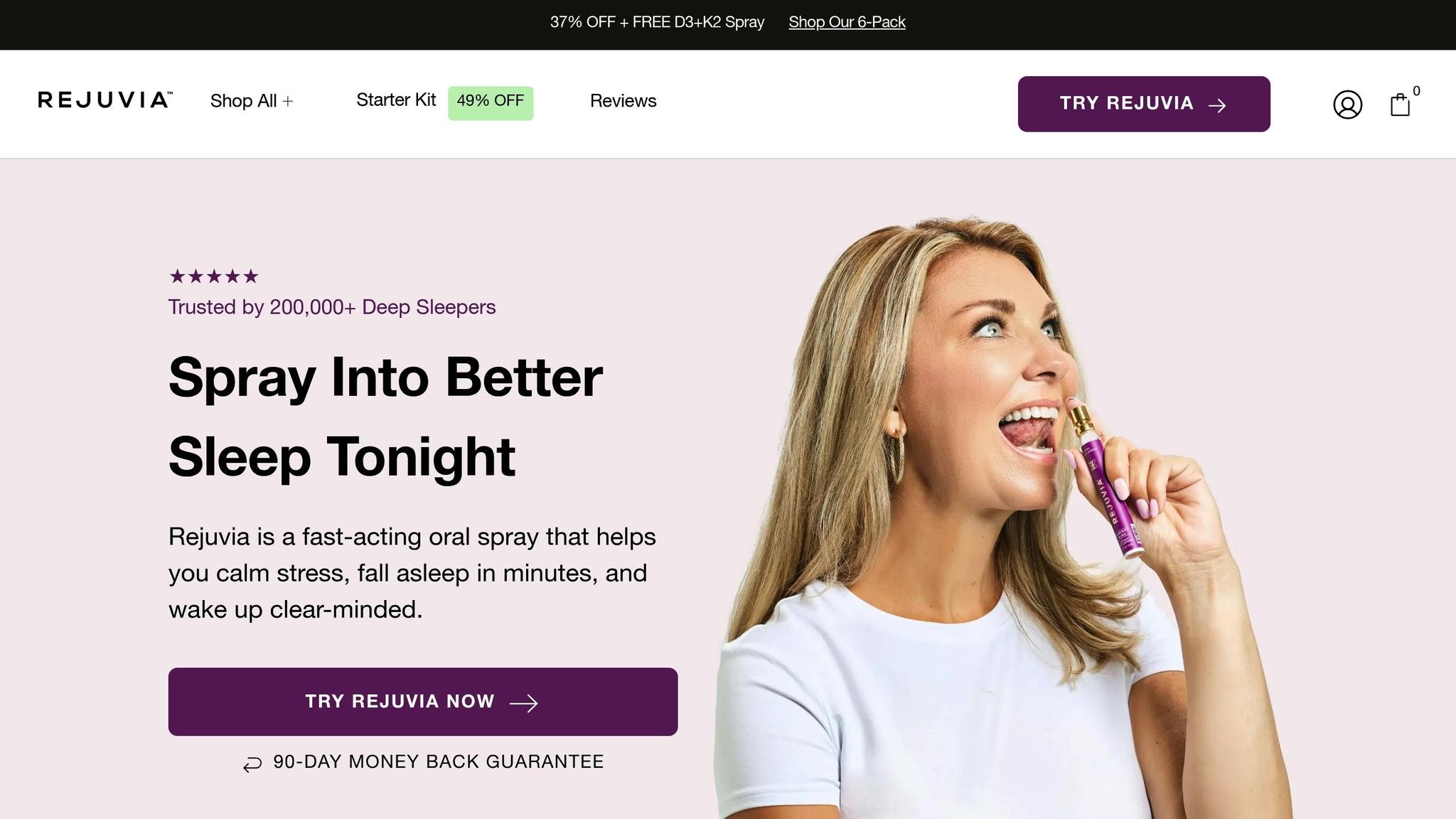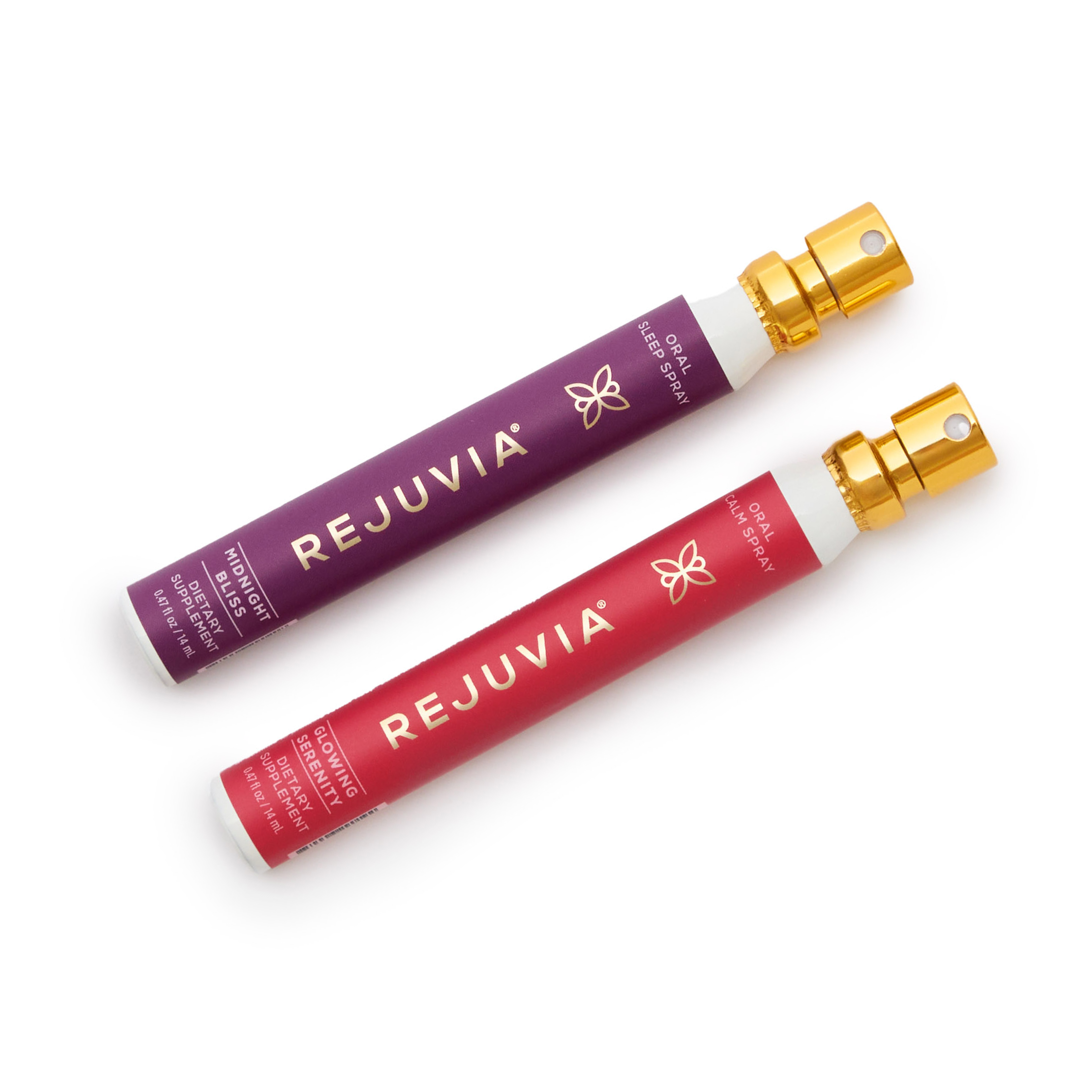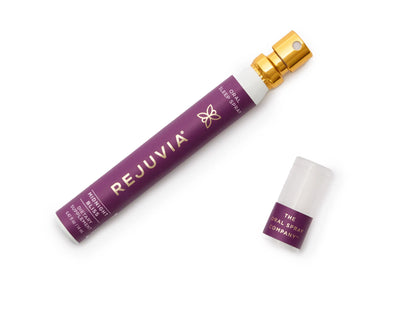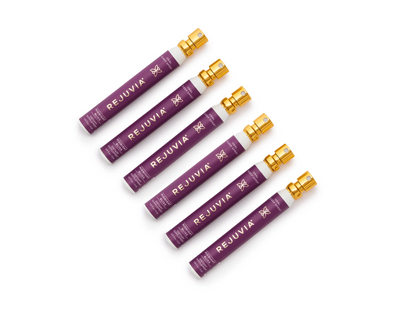Struggling with sleep? Many turn to sleep aids, but traditional options like benzodiazepines can lead to dependence, tolerance, and unpleasant side effects. Non-habit forming sleep aids offer a safer alternative by working with your body’s natural rhythms.
Here’s why custom dosing is key:
- Flexibility: Adjust your dosage to suit your specific sleep needs (e.g., falling asleep vs. staying asleep).
- Reduced Risks: Avoid dependency and minimize side effects like grogginess.
- Personalized Approach: Tailor your intake to find the smallest effective dose.
Advanced delivery methods, like oral sprays, make dosing more precise and effective by allowing fast absorption and easy adjustments. Products like Rejuvia's Sleep Spray combine natural ingredients with customizable dosing for better sleep without dependency. If sleep issues persist, consult a healthcare provider to explore the best options for you.
Is It Bad to Rely on Sleeping Pills? | Dr. Joel Fuhrman
Problems with Habit-Forming Sleep Aids
Prescription sleep medications can provide quick relief, but they come with a host of long-term risks. These concerns have led many Americans to explore safer, more natural options.
Dependency and Tolerance Risks
One of the biggest challenges with conventional sleep aids is how quickly they can lead to dependency. Medications like benzodiazepines - think lorazepam or temazepam - are especially concerning. Not only are they highly habit-forming, but when combined with prescription painkillers, they can pose serious dangers, including a potential link to dementia over time.
Nonbenzodiazepines, often marketed as safer alternatives, aren’t without their own problems. They've been associated with parasomnias - unusual behaviors like sleepwalking or even sleep-eating.
"Each of the pills has its own risks." - Dr. Lawrence Epstein, Instructor in Medicine at Harvard Medical School
Another common issue is the "hangover effect." Many users report feeling groggy, confused, or off-balance the next day. These effects can be even more pronounced in older adults or when combined with alcohol or other sedatives, creating serious safety concerns. These risks make it clear why long-term use of these medications can become a major problem.
Why Long-Term Use Is Problematic
Prescription sleep aids were never intended for prolonged use. Yet, in 2021, benzodiazepines were linked to around 12,500 overdose deaths in the United States.
Over time, these medications lose their effectiveness as users develop tolerance, often leading to higher doses. This creates a vicious cycle of dependency. Worse, when people try to quit, they frequently experience rebound insomnia - where their sleep problems return more intensely than before. Withdrawal symptoms can be so severe that tapering off these medications often requires medical supervision.
But the issues don’t stop at sleep disturbances. Long-term use can bring on a range of side effects, including digestive problems like constipation or diarrhea, dry mouth, headaches, muscle weakness, and even worsening of snoring or sleep apnea. These symptoms can significantly impact daily life and overall well-being.
All of this underscores the growing demand for sleep solutions that are non-habit forming and work in harmony with the body. The search for alternatives that avoid these pitfalls has never been more urgent.
How Non-Habit Forming Sleep Aids Work
Non-habit forming sleep aids operate differently from traditional prescription medications. Instead of inducing deep sedation, they work in harmony with your body’s natural rhythms to encourage sleep.
What Non-Habit Forming Means
When a sleep aid is labeled "non-habit forming", it means it doesn’t lead to physical dependence. You won’t experience withdrawal symptoms like rebound insomnia, nausea, or sweating if you stop using them.
The difference lies in how these aids interact with your brain. Prescription medications, such as benzodiazepines and "Z-drugs", typically target gamma-aminobutyric acid (GABA), a neurotransmitter that reduces nerve activity and induces drowsiness. Non-habit forming sleep aids, on the other hand, use gentler mechanisms. Because of this, finding the right dose is important to ensure safety and effectiveness.
While they are less likely to cause severe side effects, mild next-day drowsiness or slight cognitive effects can still occur. However, these are generally less intense compared to traditional sleep medications.
Common Natural Ingredients
Non-habit forming sleep aids often rely on natural or less invasive ingredients, such as:
- Antihistamines: Found in many over-the-counter options, these block histamine receptors to promote drowsiness.
- Melatonin and Melatonin Receptor Agonists: Melatonin, a hormone your body produces to regulate sleep, is a common supplement. Medications like ramelteon mimic melatonin’s effects, helping restore your natural sleep-wake cycle by targeting melatonin receptors in the brain.
- Orexin Receptor Antagonists: These compounds block the brain’s "wake" signals by targeting orexin receptors, encouraging sleep without disrupting other functions.
Precise dosing of these ingredients is key to maximizing their benefits while maintaining their non-habit forming properties. This careful approach highlights how personalized dosing can enhance their effectiveness even further.
Why Custom Dosing Matters
Adjusting the dosage of your sleep aid can make all the difference in how well it works. Custom dosing is key to maintaining non-habit forming benefits while promoting long-term sleep health. Unlike generic, one-size-fits-all solutions, it acknowledges that everyone’s sleep needs are unique - and that those needs can change over time.
Finding Your Right Dose
Custom dosing helps you identify the minimal effective dose - the smallest amount that delivers results without unwanted side effects. This personalized approach allows you to target your specific sleep challenges. For instance, if your main issue is falling asleep, a lower dose might suffice. On nights when frequent awakenings are the problem, a slightly higher dose could be more effective. Customizing your dose ensures you're addressing the root cause of your sleeplessness.
Individual responses to sleep aids can vary widely. For example, women often metabolize certain sleep aids differently than men, making personalized dosing critical for both safety and effectiveness. By starting with a low dose and gradually adjusting, you can find the perfect balance for your body. This tailored approach not only improves how well the sleep aid works but also minimizes risks.
Lowering Dependency Risk
Precise dosing doesn’t just fine-tune effectiveness - it also helps reduce the risk of dependency. Adjustable dosing encourages controlled, mindful use, making it less likely that you'll take more than you need. This reduces the chance of developing patterns of overuse that could lead to dependency.
The flexibility of custom dosing allows you to lower your dose as your sleep improves, so you’re not stuck taking the same amount indefinitely. For example, during particularly stressful times, you might need a higher dose to help you sleep. But once life settles down, you can scale back. This adaptability helps preserve the non-habit forming qualities of natural sleep aids.
Custom dosing also discourages the "more is better" mindset that can occur with fixed-dose products. When you know your optimal dose might be lower than the standard recommendation, you’re more likely to use sleep aids responsibly and effectively.
Better Delivery Methods for Precise Dosing
Advanced delivery methods make custom dosing even more effective. Fast-absorbing oral sprays stand out as a great option for adjustable dosing. Unlike pills, which come in fixed amounts, sprays allow for precise dose control and better absorption.
Spray technology offers several advantages. You can easily adjust the number of sprays to find the dose that works for you. Plus, sublingual absorption (under the tongue) bypasses the digestive system, delivering faster and more consistent results. This is especially useful considering that over 70% of melatonin supplements have been found to contain inaccurate dosage levels compared to their labels.
With sprays, you also get consistency from one night to the next. Each spray delivers a measured amount, taking the guesswork out of dosing. This reliability helps you maintain your ideal dose and better understand what works for your unique sleep patterns.
sbb-itb-de8e20a
Custom Dosing vs Fixed-Dose Sleep Aids
When it comes to non-habit forming sleep aids, the difference between custom dosing and fixed-dose options is an important consideration. Custom dosing provides flexibility, allowing you to adjust the amount you take based on your unique needs. In contrast, fixed-dose sleep aids come with a set dosage per serving. With custom dosing, you can find the minimum effective dose, which can help reduce side effects and lower the risk of dependency. Many experts recommend this personalized method for achieving better sleep outcomes.
Sleep specialists often stress that there’s no universal solution for everyone when it comes to sleep aids. They advise starting with the smallest possible dose and increasing it only if necessary. Custom dosing makes this approach easy to follow, aligning with established best practices for minimizing unwanted effects and avoiding dependency.
The benefits of custom dosing extend beyond just health considerations. It gives users greater control over their sleep routines, leading to a more positive experience. Adjustments can be made for specific circumstances, like travel, stress, or illness - scenarios where fixed-dose products fall short. On the other hand, fixed-dose sleep aids can be problematic for some users. The preset dosage might be too high or too low, which could either lead to excessive side effects or insufficient sleep support, making it harder to achieve restful sleep.
Side-by-Side Comparison
Here’s a quick look at how custom dosing and fixed-dose sleep aids stack up:
| Factor | Custom Dosing Sleep Aids | Fixed-Dose Sleep Aids |
|---|---|---|
| Flexibility | High – dose can be adjusted | Low – dose is preset |
| User Control | Adjustable | Fixed |
| Suitability (Long-Term) | Better for ongoing adjustment | May lead to tolerance or dependency |
| Side Effect Risk | Lower (with proper adjustment) | Higher (if dose is too high) |
| Personalization | High | Low |
| Delivery Methods | Oral sprays, dropper liquids | Tablets, capsules, gummies |
| Dependency Risk | Lower with careful use | Higher, especially with sedatives |
This comparison highlights why adjustable dosing is gaining popularity. Products like Rejuvia’s oral spray provide a precise and customizable experience. For example, Rejuvia’s spray lets you control the number of sprays per use, helping you find the perfect dose for your sleep needs. These types of products, including liquid droppers and powdered sachets, offer a level of personalization that fixed-dose options simply can’t match.
Interestingly, recent surveys reveal that nearly 20% of U.S. adults use over-the-counter sleep aids monthly. This underscores the growing demand for flexible solutions that cater to individual preferences and changing circumstances.
When deciding between custom dosing and fixed-dose sleep aids, think about your sensitivity to these products, your history with side effects, and your long-term goals. A consultation with a healthcare provider can help you determine if a customizable option is the right choice for your needs.
Rejuvia: Science-Based, Non-Habit Forming Sleep Support

Rejuvia takes a fresh approach to sleep support by combining personalized dosing with natural, non-habit forming ingredients. Founded by RC Williams and Kristen Williams, the company focuses on providing science-driven solutions for better sleep. Their innovative oral spray technology addresses common issues associated with traditional sleep aids, offering a modern alternative.
What makes Rejuvia stand out is its commitment to dosing precision and quality. Each product undergoes triple lab testing to guarantee purity and potency, ensuring users get consistent and reliable results. This attention to detail underscores their mission to deliver a truly tailored sleep experience.
Rejuvia Sleep Spray Features
Rejuvia's Sleep Spray brings customizable, non-habit forming sleep support to the forefront with several standout features. The oral spray format ensures rapid absorption, helping users fall asleep faster compared to pills or capsules. It also allows precise control over dosing, enabling nightly adjustments to suit individual needs.
The spray is made with natural, science-supported ingredients designed to promote restful sleep without the risk of dependency. Each bottle provides 30 servings for $39 and comes with a refreshing mint flavor. Plus, it meets vegan and non-GMO standards, reflecting the brand's dedication to quality.
Unlike prescription or over-the-counter sleep aids that can lead to dependency, Rejuvia’s formulation avoids physical tolerance or withdrawal symptoms. This makes it a safe option for both occasional and regular use. Users can start with one or two sprays and adjust the dose as needed, following the principle of finding the minimum effective dose. This reduces the likelihood of side effects like morning grogginess.
How Rejuvia Improves Sleep Quality
Rejuvia's focus on improving sleep quality revolves around its high bioavailability and customizable dosing. The oral spray design ensures fast absorption, with active ingredients entering the bloodstream quickly to support falling asleep without the delays often seen with traditional aids.
The ability to adjust the dose offers flexibility to address individual sleep challenges. This personalized approach overcomes the rigidity of fixed-dose alternatives. Many users report waking up feeling refreshed and alert - a result of the natural ingredient blend and precise dosing, which works in harmony with the body's natural sleep cycles rather than forcing sedation.
The formulation also supports deeper, more restorative sleep by enhancing the body’s natural processes. It tackles both falling asleep and staying asleep, providing a sustainable solution for long-term sleep health. Thanks to its non-habit forming design, Rejuvia remains effective over time without requiring higher doses. This makes it a dependable choice for anyone looking to improve their sleep while maintaining control and avoiding dependency. The personalized dosing not only enhances sleep quality but reaffirms the commitment to safe, long-term sleep support.
Conclusion: Better Sleep Through Personalized Solutions
Achieving better sleep doesn’t have to mean relying on medications with risks of dependency or rigid, one-size-fits-all dosages. Sleep aids that are non-habit forming and offer adjustable dosing provide a smarter, more adaptable way to maintain long-term sleep health. These options give individuals the flexibility to meet their specific needs while reducing the risks of tolerance and withdrawal often associated with traditional sleep medications.
Customizable dosing is particularly beneficial because it allows users to find the lowest effective dose for their needs. This approach not only minimizes the chance of dependency but also encourages addressing the root causes of sleep problems rather than just masking the symptoms. Over time, this can lead to healthier and more sustainable sleep patterns.
For those concerned about addiction or overuse, starting with a minimal dose offers a sense of control and reassurance that many sedatives simply can’t provide.
A great example of this personalized approach is Rejuvia's Sleep Spray. Made with science-backed natural ingredients, this oral spray is designed for precision. Its adjustable dosing lets users tailor their intake to tackle specific sleep challenges, helping to avoid issues like next-day grogginess or cognitive fog that can accompany conventional sleep aids. It’s a clear demonstration of how tailored solutions can meet individual sleep needs effectively.
Of course, persistent or severe sleep issues should always be discussed with a healthcare provider. That said, non-habit forming options are invaluable for both occasional and ongoing support. The increasing demand for safer sleep alternatives shows that more people are recognizing the risks of long-term sedative use. Personalized, non-habit forming solutions are not just a better choice - they’re essential for maintaining sustainable and healthy sleep.
FAQs
What makes non-habit forming sleep aids different from prescription sleep medications?
Non-habit-forming sleep aids are crafted to align with your body's natural sleep rhythms, offering support without the risk of dependency. These aids typically work by interacting with melatonin receptors or other natural pathways that regulate sleep, encouraging a more balanced and restorative night's rest.
On the other hand, many prescription sleep medications, such as benzodiazepines, function by boosting the activity of GABA - a neurotransmitter in the brain responsible for inducing sedation. While these medications can be effective, they often come with the risk of dependency and may interfere with your natural sleep cycle over time.
For those seeking a safer, long-term solution, non-habit-forming options provide a gentler approach, promoting sleep regulation naturally and without leaving you feeling groggy or reliant.
What makes oral sprays an effective option for personalized sleep aid dosing?
Oral sprays offer a fast and efficient way to personalize your sleep aid routine. Unlike pills or gummies, they’re absorbed more quickly by the body, which means the ingredients start working faster. This can help you fall asleep sooner and stay asleep longer.
Another advantage is the precise dosing they provide. You can easily adjust the amount to suit your specific needs, giving you more control over your sleep support. And because they’re non-habit-forming, oral sprays offer a safe option for achieving restful sleep without concerns about dependency.
How do I find the right custom dose for better sleep, and what should I keep in mind when adjusting it?
Finding the right dose to improve your sleep often starts with the lowest effective amount - usually between 0.5 and 5 milligrams - taken about 30 minutes before you head to bed. Starting small helps reduce the chance of side effects while giving you a chance to see how your body reacts.
When tweaking your dosage, keep in mind factors like your age, weight, overall health, and any medical conditions you may have. These can all influence how your body handles sleep aids. Pay attention to how well you’re sleeping and watch for any side effects. If your sleep issues continue or you’re uncertain about making changes, it’s always a good idea to check in with a healthcare professional to stay safe and get the best results.
Related Blog Posts
- Why You Can't Sleep: 8 Common Causes
- Best Natural Stress Relief Methods in 2025
- Complete Guide to Better Sleep Naturally
- 5 Ways Stress Ruins Your Sleep Quality





